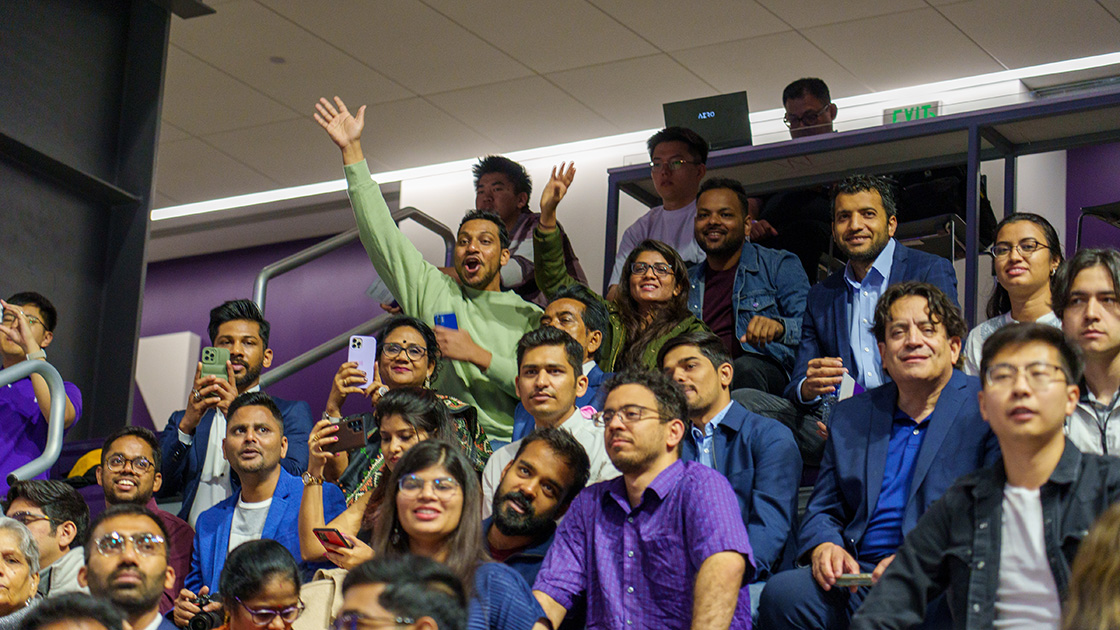Rodney D. Priestley Challenges Graduates to Use Education for Good
Priestley and Dean Julio M. Ottino spoke at the PhD Hooding and Master’s Recognition Ceremony on June 11

Even before speaking at Northwestern Engineering’s 2023 PhD Hooding and Master’s Recognition Ceremony, Rodney D. Priestley (PhD ’08) had a busy couple of weeks. First, he participated in commencement exercises at Princeton University, where he serves as dean of the Graduate School and Pomeroy and Betty Perry Smith Professor of Chemical and Biological Engineering. Then, as an institutional delegate, he took part in the inauguration of Northwestern University President Michael Schill.
Those honors compelled Priestley to reflect on his own journey. For the first time in years, he opened his PhD thesis and saw the dissertation was dedicated to the Ronald E. McNair Scholars Program, a US Department of Education program that provides undergraduate students from first-generation/low-income or underrepresented backgrounds valuable research experience with the hope of propelling them toward a career in research or academia.
Without that program, Priestley wouldn’t have accomplished what he has during a journey that included earning his doctorate in chemical engineering from the McCormick School of Engineering.
“The McCormick experience has profoundly shaped my journey, which I've come to reminisce about lately,” Priestley said. “There are many themes I Iearned at Northwestern that continue to challenge me today and influence my career.”

Priestley delivered that message to the newest graduates from Northwestern Engineering’s PhD and master’s programs during the June 11 event held at Welsh-Ryan Arena. Priestley was introduced by outgoing Dean Julio M. Ottino, who stressed the importance of engineering in a trying era.
“Change brings challenges, but challenges bring opportunities. As engineers and designers, this must be our time,” Ottino said. “Throughout your time at Northwestern, I hope that you have learned to collaborate, to trust others, and to bring different and diverse ideas into everything that you do. In doing so, I know that we can continue to ensure that times of change become times of opportunity, and that we can use the thinking skills of engineering to make lives better for people around the world.”
That has been Priestley’s goal, and he conveyed that to the audience through three themes he picked up while in Evanston.
Impressions
During his first summer as a graduate student, Priestley was so excited about a set of experiments running overnight that he got to his lab around 5 a.m. Surprisingly, one of Priestley’s advisers was already there, and the two spoke about the experiments.
That moment left a mark on his adviser, who assumed that Priestley rose that early every day. That wasn’t the case, but it made Priestley think about the role of impressions.
View photos from the ceremony >>
“Your actions — whether arriving early to the lab (as I did most days, but certainly not at 5 a.m.) or ensuring that you treat everyone with dignity and respect, or insist on creating opportunities for others — tell those around you about your character without saying a word,” Priestley said. “So, as you depart this great campus and meet new colleagues, join new teams, and hopefully experience something truly different, the first challenge I offer is to make sure to think about what impression your actions are giving others — make your first impressions count, and do so by your actions, not your words.”
Ideas
When Priestley first came to Northwestern, one of his concerns was whether he could generate new ideas. He learned that great ideas are not usually the product of eureka moments, but often need time to develop through collaboration with others. Those colleagues don’t have to come from one discipline, but Priestley said “we also need to think about human diversity's power in convergence discussions as a framework for truly revolutionary ideas in the 21st century.”
The human factor is also a consideration. Priestley challenged universities to make bold commitments to make sure diverse groups have opportunities to participate, as greater participation creates more and better ideas and, subsequently, better universities.
“I challenge you to be great minds,” Priestley said. “Discuss small and big ideas, discuss those that might impact one person or permeate globally, but more importantly, participate in the process because your ideas and those of your peers are needed.”
Innovation
Priestley has cofounded several companies, but he said only one has had marginal success. He’s had dozens of patents, but only a few have been licensed. Yet he was still named Princeton’s first vice dean for innovation in 2020.
Why did he get that position? Priestley said how we think about innovation and entrepreneurship are equally important. He wants Princeton’s knowledge and inventions to have an impact, and also desires success for those who create new structures and institutional programs that improve the university’s research and teaching mission.
I challenge you to be great minds.
Doing that requires risk, which Priestley said must come from an environment where failure is an option if it is used as an educational experience.
“To continue developing as innovators, which is my third challenge to you, is to continue to ask questions, to continue to develop ideas, to continue to listen, and to become comfortable with taking calculated risks and recognizing that failure is a possibility,” Priestley said. “Rely upon your whole-brain engineering education — be inclusive in your innovation, and engage at the interface and within various disciplines. And remember that innovation is a social process.
“Then what better way to increase your odds that the outcome is greater than the sum of the inputs than to engage with all of society as you bring about the next big thing.”





